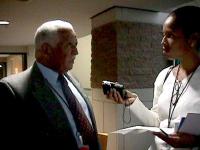
|
| Malawi Minister Harry Thomson with Lisa Deaderick
|
| Photo: Erika Alexander |
|
|---|
Tucson, AZ •• Dec. 15, 1999 •• SolarQuest® iNet News Service ••
Mr. Harry Thomson, Minister of Natural Resources and Environmental Affairs for Malawi, has spent many years working with his country’s government prior to his current position. I spoke with Mr. Thomson about his goals here at the conference and his hopes for his country’s development in the area of energy as well as its current standing in this area.LD: As far as energy is concerned, what aspects are you really looking into for your country?
Min. Thomson: Well what we’re looking at as (a) minister responsible for energy and the energy sector in Malawi is (that) we’re looking at alternative energy to what we have at the moment, which is hydro-electric. But we are not able to meet the rural area with the hydroelectric, so we’re looking at a different type of energy. And what we’re interested (in) here at this conference is to establish ourselves as much as possible and get as much information on the solar system, which I can see is displayed in a big way here. Plus, the biomass. LD: What aspect, as far as solar energy, are you really looking towards?
Min. Thomson: We’re looking at all of it. All of it from the beginning, right throughout. And we have already got one pilot scheme in one of the districts in Malawi. We’re looking at doing another three districts within the first quarter of next year. What we have to do is try and look at how best, how competitive as well as it being sustainable and affordable because solar as a capital investment is not cheap. It is rather expensive. LD: Are there any joint ventures that have been proposed between any businesses or companies here to work with your country to fund the solar projects?
Min. Thomson: We’ve talked with some companies, but we haven’t concretized anything yet. I’m hoping to do that before we leave on Thursday. I hope we can come up with something more positive than is the case at the moment. LD: Are there any that look promising so far?
Min. Thomson: Most of them do look promising, but when you get down to looking at distances, especially I think our biggest inhibiting factor is the distances one has to travel from here to my part of the world, and that will obviously have a bearing on the costs. So we have to take all of this into consideration before making a final decision, but the interest is there. LD: Have you been approached before this conference by any businesses about working on these kinds of plans for your country?
Min. Thomson: Not American businesses, but quite a few from Europe and around Africa here. LD: What are your feelings about how it took America so long before it approached you?
Min. Thomson: I think what has happened is, the continent of Africa is and has been out of reach for many Americans for many years. This conference is opening out new ventures. To some extent you can say that maybe even pioneering means of ways of doing business with Africa. I think that’s what it is. LD: How strongly do clean energy and climate change options affect Malawi?
Min. Thomson: Quite a lot, quite a lot. Fortunately, our environmental problem, if I may call it that, is unlike what it is in the developed world like here. You have for instance, problems with your…your environment is more problems with the ozone layer and that sort of thing. We don’t have that kind of problem, our problem is deforestation, and that is where we have a tremendous problem because the average Malawian depends on firewood for cooking. And that of course means deforestation…we had large mountains and hillsides before when the population was much smaller. Today we find that all these hillsides are barren. We’re in the process of reforesting, and on the 10th of next month I’m having a competition throughout the whole country on tree-planting to try and get that back. So we have different kinds…we have environmental problems, but they are on a different scale in my part of the world to another part of Africa even. Let alone the developed world. So we do have different problems, but all emanating from the environment. LD: Well on that note about the deforestation, how do you feel about the solar cooking and solar ovens and that Sun Ovens International is here and they are talking about grant programs, joint grant programs about purchasing these huge ovens for communities and villages?
Min. Thomson: See, what we have to do with that, we’ve been looking at that right now. If we go in for the solar system, the type of solar system we’re looking at is just the small panels, which will give lighting. And it will make life very much…an easier way…a better life for people in rural areas. Which up until now, because of the lack of electricity, they would have to go to sleep as soon as it gets dark. There’s nothing more for them to do, but with the lighting from the solar panels that will give them light. But it will not answer the question of, for instance, cooking. Unless we go into the very expensive ones (and) to get into the expensive ones, then one has to compare costs between the electricity, which is generated by hydropower in my country, compared to that which is the cheapest. Because it will be expensive whichever way we look at it. LD: How much anticipated economic growth is being expected from any joint ventures with the American businesses?
Min. Thomson: If we look at 5% economic growth annually, (that) is something that I think is on the positive side.
|

